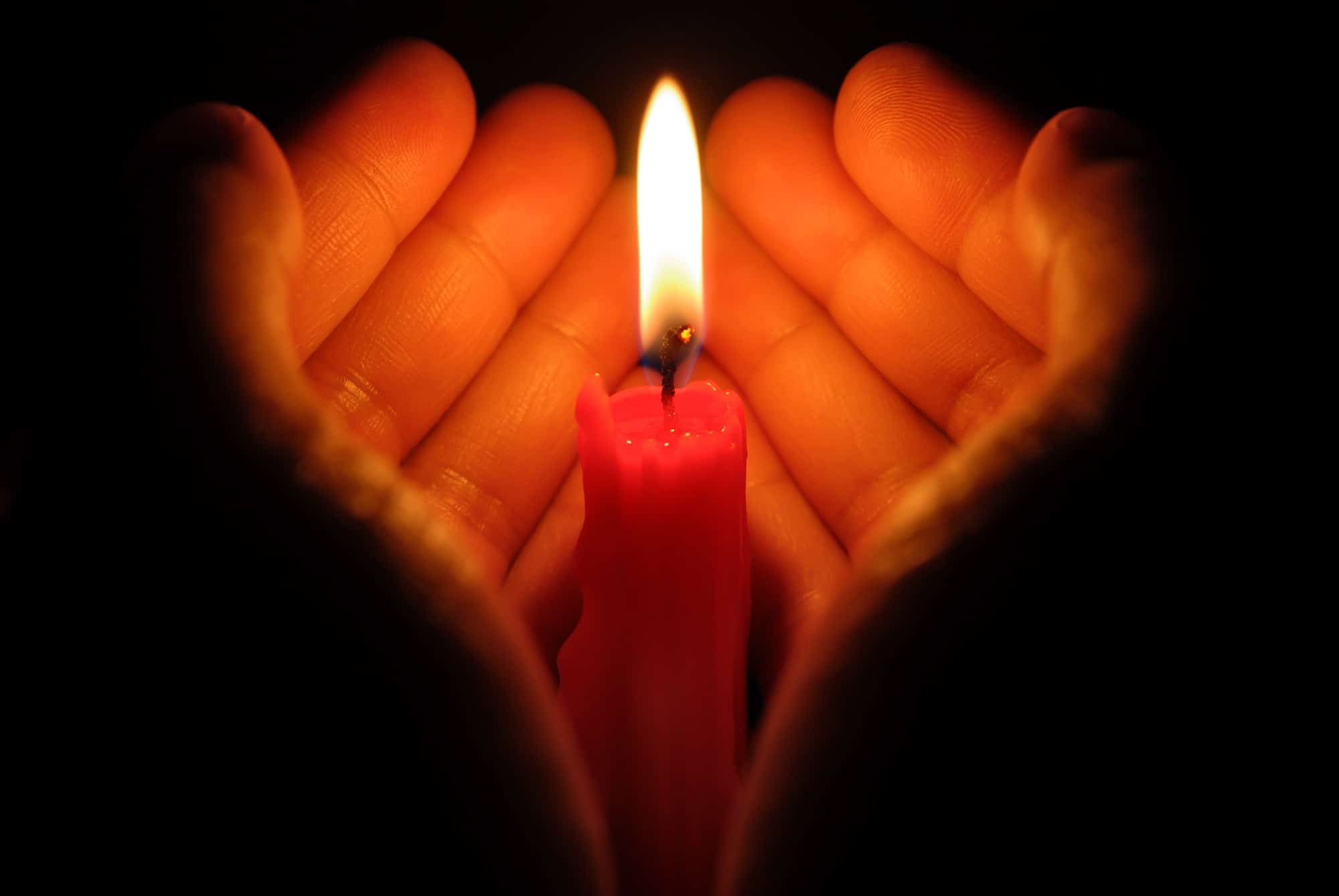“I realised caregiving is an act of worship”: Nurse who spent 20 years caring for mother and husband with stroke
by Gracia Lee // August 26, 2020, 7:21 pm
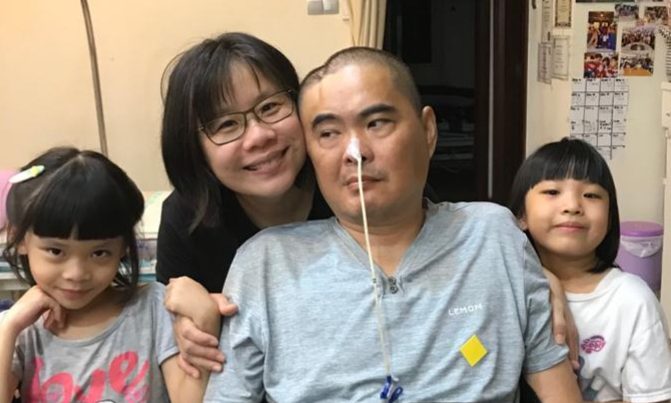
"Caregiving is for the long-haul. It's not a sprint, it's a marathon. So, you must find your stillness in the eye of the storm," shared Chia Yen-Yen, 52, who is the main caregiver for her husband, Humphrey, after he suffered a stroke. They are pictured here with their two daughters. All photos courtesy of Chia Yen-Yen.
Few are as well-acquainted with caregiving as Chia Yen-Yen, a professional nurse who has spent almost 30 years caring for patients in hospitals and 20 years as a personal caregiver for her loved ones.
The 52-year-old had been her late mother’s main caregiver for 16 years until the latter, who was a stroke patient, passed away in 2016.
In May last year, Chia also became the main caregiver to her husband, Humphrey, who suffered a stroke that left him bedridden. They have two adopted daughters aged six and eight.
Chia, who quit her job in January this year, currently also cares for her father, who has osteoarthritis, hypertension and high cholesterol. He is housebound and lives with her.
A seasoned caregiver, who knows full well the stresses of caregiving, Chia shares six tips that have helped her to manage these demanding but important responsibilities.
1. Prioritise what is important
It is easy to feel overwhelmed by the many responsibilities as a caregiver, especially when urgent needs come up and throw plans into disarray.
“When everything is settled, I promised to make up for whatever that I’ve fallen short of.”
While she was still working, Chia made her priorities clear – family over work.
She communicated to her colleagues that she had to leave work on time, and did not hesitate to “drop everything” to attend to her family’s needs in an emergency.
When she needed extra time off to care for her mother or husband, she was also “very thick-skinned” to ask for no-pay leave.
“Whether they understand or not, I do not know. But I made it very clear to my bosses that my mom, my dad, my husband and my children are more important to me than my job.
“But when everything (at home) is settled, I promised to make up for whatever that I’d fallen short of,” she said.
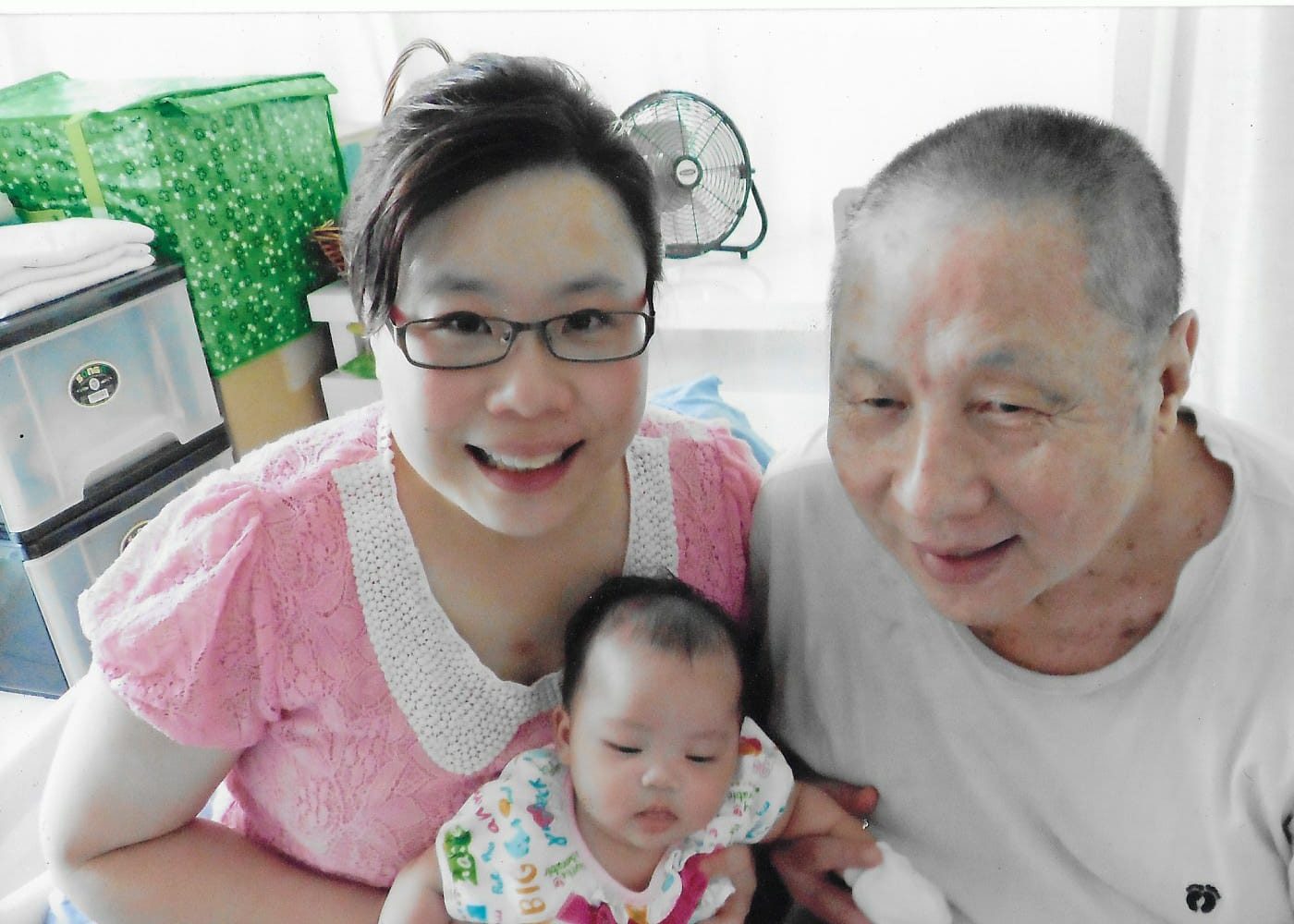
Chia with her father, who lives with her, and her daughter En En.
On the home front, she also communicates to her two helpers that it is more important to take care of the people in the house rather than the house itself.
“I tell them, I can live with an untidy house, but you must take care of my husband, my daddy and my two children. They’re very important to me,” she said.
“You must know how to prioritise what is urgent and important,” she added. “Do those things first, and then you can catch up on the other things later.”
2. Recognise your limits
Even though her experience as a nurse has equipped her to look after her loved ones better than most, Chia is not spared from feeling helpless as a caregiver.
“Understand that there’s only so much you can do, and don’t feel guilty that you’ve reached your limit.”
“As my mother’s daughter, my husband’s wife … I want to do much more for them but I cannot. There’s very little that I can actually do,” she admitted.
When she reaches a point where her skills and knowledge cannot improve the situation, she realises that she has to “let go and let God”.
“It’s beyond me already. I’ve done by best,” she recognised.
Addressing caregivers, she added: “Understand that there’s only so much you can do, and don’t feel guilty that you’ve reached your limit. You’re not a hero. God is.”
Recognising her limitations has also helped her through the times she has had to make tough life-or-death decisions for her husband.
“If God allowed him to live (in this state), then who am I to say that I wish him not to live?”
For example, after his emergency craniotomy, doctors recommended taking him off the ventilator – a life support machine – as his breathing tube was being blocked by accumulating secretions.
However, there was a chance that he would stop breathing on his own after the extubation.
Though Chia could opt to have him resuscitated, this would mean that he would likely have to live the rest of his life with a tube permanently inserted into his windpipe.
Knowing that her husband, whom she described as a free spirit, would not want to live his life as a total care patient, she struggled with deciding whether to resuscitate him or not, should he stop breathing on his own.
After praying and meditating on God’s word, she eventually decided to leave the outcome in God’s hands, opting not to have him resuscitated if he stopped breathing.
“God is the giver of life. God is the One who takes it away. I have to face that reality,” she said. By God’s grace, Humphrey managed to breathe on his own after extubation.
“There is a greater purpose that I don’t understand, but later on I will understand.”
Said Chia: “When I’ve reached my limit, I surrender. But I don’t surrender to the fate of something or to the situation. I surrender it to God, who is sovereign, good and loving.
“That’s the only time that your faith can be strengthened – when you surrender all to God and let him take care of it.”
This experience has also helped her to press on in caring for Humphrey.
She confessed that she feels heartbroken seeing her husband in this state, and has ever wondered if he would be better off with the Lord.
But then she remembered how God had preserved his life. “If God allowed him to live, then who am I to say that I wish him not to live?
“Who am I to judge that his life is not worth living when God has decided that he is worth it, even in his state? There is a greater purpose that I don’t understand, but later on I will understand.”
3. Forgive yourself
Chia is also no stranger to caregiver guilt.
“One of the things I realised as a caregiver is that it’s very difficult to forgive yourself for the limitations that you have,” she said.
She admitted that she has lost her temper with her father and late mother, and struggled with feelings of guilt afterwards. But this has taught her the importance of apologising and seeking forgiveness.
“‘Sorry’ is a very important word. I’ve learnt to say sorry to them when I’ve lost my cool. I’ve learnt to say sorry to myself. As a caregiver, please be forgiving of yourself,” she said, acknowledging that it is not an easy job.
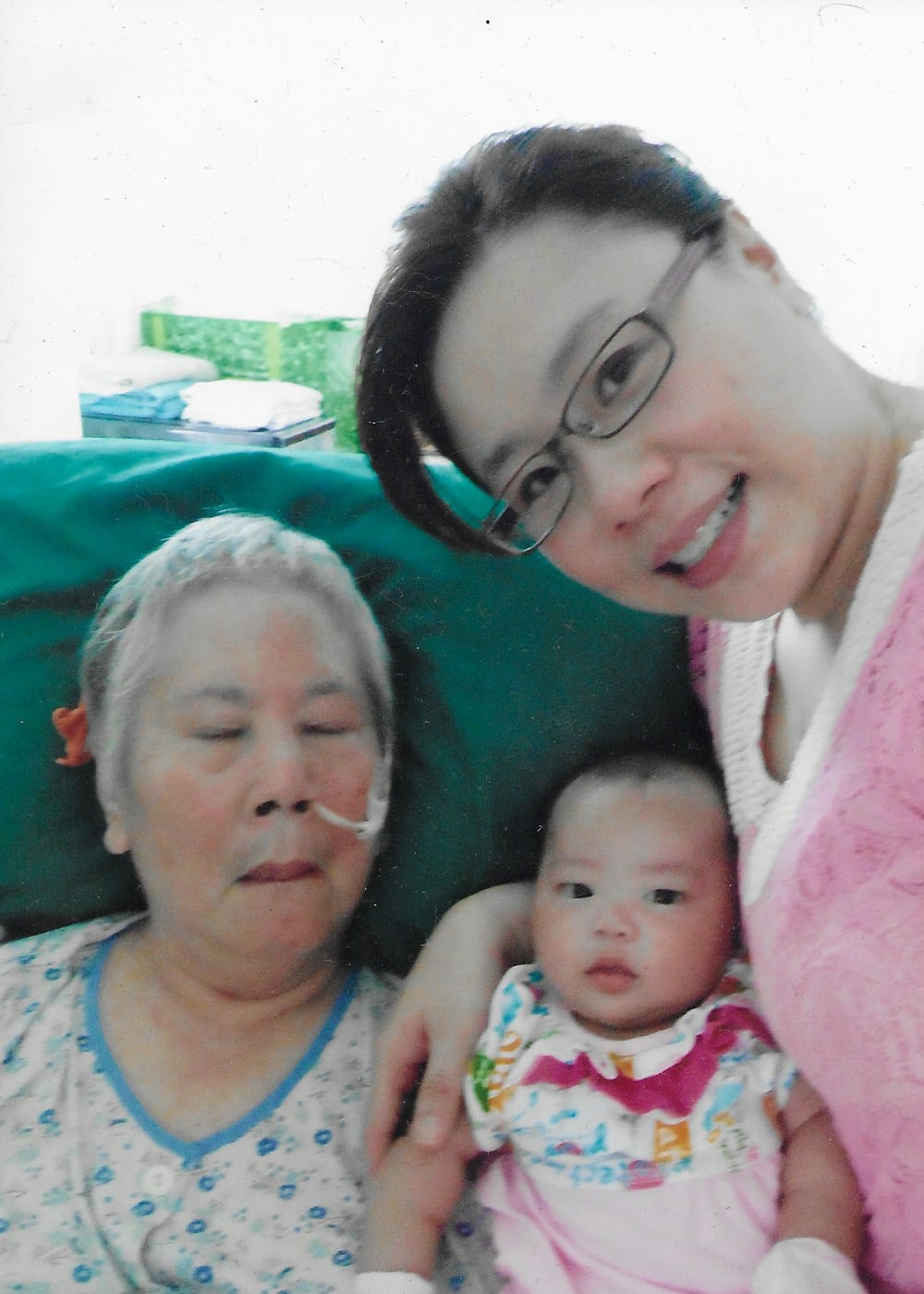
Chia with her late mother and daughter En En in 2014.
Recalling one of her lowest moments in her caregiving journey, she recounted the time she had tried to remove a crust-like object she had found in her mother’s mouth.
“I’ve learnt to say sorry to them when I’ve lost my cool. I’ve learnt to say sorry to myself.”
Her attempts were unsuccessful. Later, she found out that her mother had inhaled it. The older woman then developed a high fever and chest infection, and had to be hospitalised.
“I lived with that guilt for a very, very long time,” Chia confessed. “Even as I talk about it four years later, the feelings are quite intense.”
It was only after her mother’s passing in 2016 that she managed to forgive herself, she said, adding that she confessed it to God and a social worker.
“Finally, when I forgave myself, it was such a relief. It was a release.”
4. Don’t be reluctant to receive help
Since she recognises that she has limitations, Chia is not afraid or embarrassed to ask others for help.
“I call for help – SOS! I not shy. Thick-skinned one.”
For example, she was quick to employ two foreign domestic workers and often reminds them how important their jobs are. “I treat them like family. I cannot do without them,” she said.
She also often calls up her friends and family members to ask for a helping hand. “I call for help – SOS! I not shy. Thick-skinned one,” she declared good-naturedly.
However, she makes it a point to ask for help in tasks that are more manageable, such as taking her daughters out or ferrying her father to medical appointments.
Surrounding herself with a good support system is crucial to pressing on in her caregiving journey.
“My friends and family have been so willing to help me. I can tell you that people who come on board my journey feel very blessed. They’ve had a chance to give of themselves to me, my children and my husband,” she said.
“I feel like I’m in the business of making them feel good about themselves!” she added candidly.
Surrounding herself with a good support system has also allowed her to have some uninterrupted time to recharge and recentre herself on God – something she said is crucial to pressing on in her caregiving journey.
“You must remember that caregiving is for the long-haul. It’s not a sprint, it’s a marathon. So, you must be intentional about being still. You must find your stillness in the eye of the storm,” she said.
5. Choose to be thankful
Wearing her heart on her sleeve, Chia also shared that she experiences “a very deep loneliness” coping with her husband’s stroke, which has left him a total care patient.
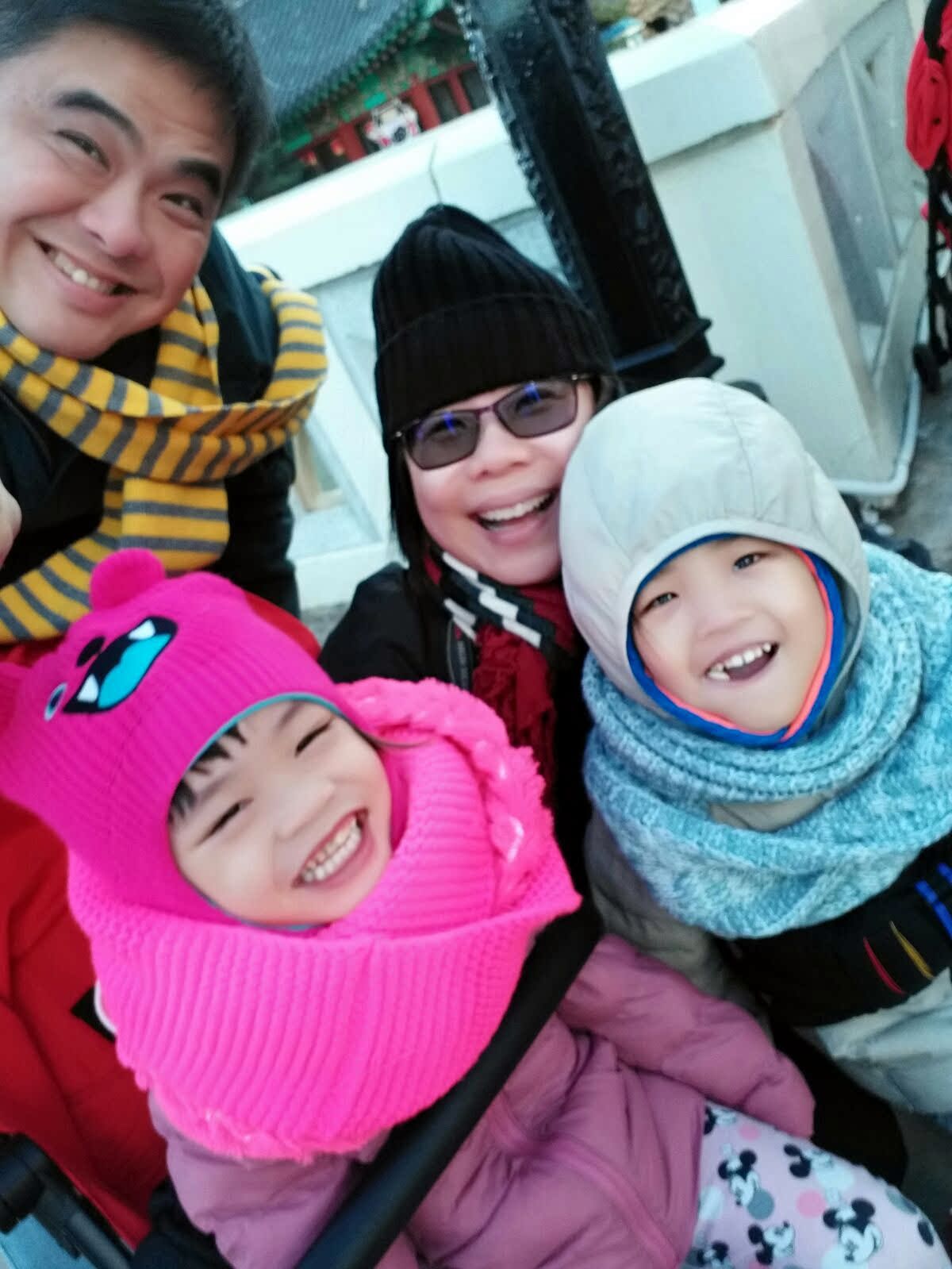
Chia’s family in “happier days” during a holiday to Seoul, Korea, in 2017.
“I grieve over my husband for who he was before. I grieve for the husband that I used to know. There’s a void that is missing … God can fill this void, but it’s still lonely,” she said.
She also realises that her two young daughters have lost a father figure, and feels the need to play a dual parenting role.
However, Chia still chooses to be thankful in these circumstances (1 Thessalonians 5:18). “I look at the things I still have, rather than the things that I have lost,” she said.
“I look at the things I still have, rather than the things that I have lost.”
The praise on her lips overflows as she counts her blessings – financial stability, a good support system, a husband who is still physically present with them.
“Like Jabez in 1 Chronicles 4:9-10, God has enlarged my territory by enlarging my capacity and capability to take on more responsibility,” she said, adding that she has found joy in this posture of gratitude.
Of this Chia is sure: God will supply all she needs (Philippians 4:19).
She remembers that the Lord knows all of her needs (Matthew 6:26) and is faithful in everything (Psalm 145:17).
Her life, as she presses on with joy, is a living testimony of God’s sufficiency, she said. “His grace is sufficient – not just His saving grace, but His empowering grace.”
6. Remember that there is a greater purpose
While it is easy to lament and wallow in self-pity, Chia believes that there is a greater purpose to the hardship she is enduring.
“Even though I have these low moments, they always bring me back to God. And I believe these tests and trials really mould my character (Romans 5:3-5) and surface those values that are incorrect,” she said.
Over the years, she has learnt to accept her lot. “So I don’t begrudge. I do it cheerfully, willingly, gladly. I know God has planned and purposed it, and I know there is a higher purpose,” she said.
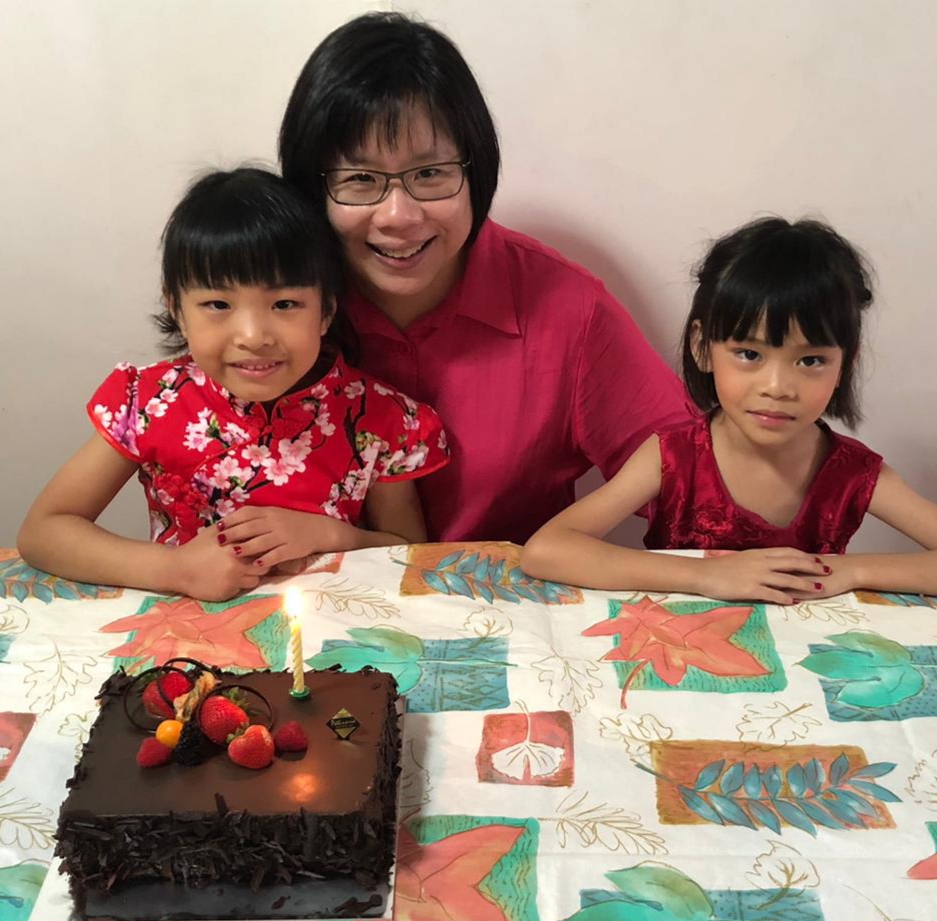
Chia believes that doing her job well as a mother to her two daughters, En En (right) and Hui Hui, is an act of worship unto God.
Just this month, she was reminded by James 1:27 that her caregiving, no matter how tough, is a form of worship unto God.
“I realised that when I care for my loved ones, I am worshipping God.”
In the Easy-to-Read Version (ERV), James 1:27 says: “The worship that God wants is this: caring for orphans or widows who need help and keeping yourself free from the world’s evil influence. This is the kind of worship that God accepts as pure and good.”
Said Chia: “I realised that when I care for my loved ones – my children who became fatherless overnight and my father, who is a widower – I am worshipping God.
“The kingdom of God is here, and you can demonstrate the kingdom of God by bringing the presence of God into your caregiving.”
With that, she soldiers on in the good days and bad, resting in the gift of each new day.
If you’d like to read more about Chia Yen-Yen’s caregiving journey, you may request for her complimentary book, So You Would Come, via [email protected].
Who cares for the caregivers? 70-year-old Auntie Audrey does
Who cares for the caregivers? 70-year-old Auntie Audrey does
We are an independent, non-profit organisation that relies on the generosity of our readers, such as yourself, to continue serving the kingdom. Every dollar donated goes directly back into our editorial coverage.
Would you consider partnering with us in our kingdom work by supporting us financially, either as a one-off donation, or a recurring pledge?
Support Salt&Light

